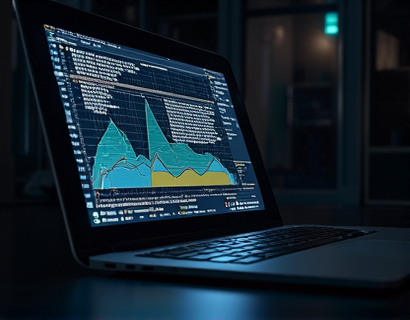Advanced Smart-Contract Technology for Seamless Token Management Pegged to UCASH and U Assets
In the rapidly evolving landscape of blockchain and cryptocurrency, the need for efficient and secure token management solutions has become paramount. This article delves into the advanced smart-contract technology that streamlines token management, particularly for tokens pegged to UCASH and other U assets. By leveraging cutting-edge smart-contract solutions, users can achieve seamless integration with leading cryptocurrencies and digital assets, enhancing both security and efficiency in their financial ecosystems.
Tokenization has emerged as a transformative force in the financial world, enabling the creation and management of digital assets that represent various forms of value. However, the complexity of token management, especially when dealing with assets pegged to specific cryptocurrencies like UCASH, can pose significant challenges. Smart-contract technology addresses these challenges by providing a robust, automated, and transparent framework for managing tokens.
Understanding Smart Contracts
Smart contracts are self-executing contracts with the terms of the agreement directly written into code. They run on blockchain networks, ensuring transparency, immutability, and security. In the context of token management, smart contracts serve as the backbone for automating various processes, from token creation and distribution to trading and redemption.
The primary advantage of using smart contracts for token management is their ability to enforce predefined rules and conditions without the need for intermediaries. This not only reduces costs but also minimizes the risk of human error and fraud. For tokens pegged to UCASH or other U assets, smart contracts can automatically adjust token values based on the underlying asset's price, ensuring that the token remains closely aligned with its peg.
Pegging Tokens to UCASH and U Assets
Pegging a token to UCASH or other U assets involves establishing a fixed exchange rate between the token and the underlying asset. This mechanism is crucial for maintaining stability and trust in the token's value. Smart-contract technology facilitates this process by continuously monitoring the price of the underlying asset and adjusting the token's value accordingly.
The smart contract is programmed to execute price checks at regular intervals or in real-time, depending on the implementation. When the price of UCASH or the U asset fluctuates, the smart contract automatically recalibrates the token's value to maintain the peg. This ensures that holders of the token can trust that their investment remains closely tied to the value of the underlying asset.
Enhanced Security through Smart Contracts
Security is a top priority in the world of cryptocurrency and token management. Smart contracts offer several security benefits that traditional systems often lack. First, the code governing the smart contract is transparent and auditable, allowing developers and users to review and verify its functionality. This transparency reduces the risk of hidden vulnerabilities and increases trust in the system.
Additionally, smart contracts operate on blockchain networks, which are inherently secure due to their decentralized and distributed nature. Once deployed, smart contracts cannot be altered or tampered with, ensuring that the rules and conditions set for token management remain consistent and reliable. This immutability is particularly important for tokens pegged to UCASH and other U assets, where any alteration could disrupt the peg and erode user trust.
Efficiency in Token Management
Efficiency is another key advantage of using smart-contract technology for token management. Traditional token management systems often rely on centralized authorities or intermediaries to handle various tasks, such as token issuance, trading, and settlement. These processes can be slow, costly, and prone to errors.
Smart contracts automate these processes, executing them instantly and accurately without the need for intermediaries. This not only speeds up transactions but also reduces transaction fees and the potential for human error. For users managing tokens pegged to UCASH and other U assets, this means a more streamlined and efficient experience, allowing them to focus on their investment strategies rather than the intricacies of token management.
Use Cases and Applications
The applications of advanced smart-contract technology in token management are diverse and far-reaching. One prominent use case is in decentralized finance (DeFi) platforms, where tokens pegged to UCASH can be used for lending, borrowing, and yield farming. Smart contracts ensure that these operations are executed securely and efficiently, providing users with greater access to financial services.
Another significant application is in supply chain management, where tokens can represent physical assets or commodities pegged to UCASH. Smart contracts can track the movement of these assets, ensuring transparency and traceability throughout the supply chain. This is particularly valuable for industries that require high levels of accountability and compliance.
Challenges and Considerations
While the benefits of smart-contract technology for token management are clear, there are also challenges and considerations to keep in mind. One of the primary challenges is the complexity of smart-contract development. Creating robust and secure smart contracts requires specialized knowledge and expertise in blockchain programming.
Another consideration is the regulatory landscape. As the use of cryptocurrencies and tokens continues to grow, regulatory frameworks are evolving. Developers and users must stay informed about local and international regulations to ensure compliance and avoid legal issues.
Future Developments
The future of smart-contract technology in token management looks promising, with ongoing advancements set to enhance its capabilities. One area of development is the integration of oracles, which provide smart contracts with external data feeds. This allows for more accurate and real-time price adjustments, further improving the reliability of tokens pegged to UCASH and other U assets.
Additionally, the rise of cross-chain interoperability is opening up new possibilities for token management. Smart contracts that can operate across multiple blockchain networks will enable more seamless and versatile token management solutions, breaking down silos and fostering greater interconnectedness in the blockchain ecosystem.
Conclusion
Advanced smart-contract technology is revolutionizing token management, offering enhanced security, efficiency, and transparency. For tokens pegged to UCASH and other U assets, smart contracts provide a reliable and automated solution for maintaining the peg and managing token operations. As the technology continues to evolve, it will play an increasingly crucial role in shaping the future of digital finance and asset management.










































